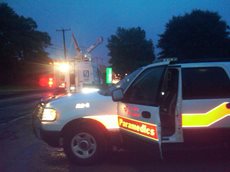Emergency Medical Services Q & A
What is a Paramedic?
Paramedics are licensed professionals who can perform tasks beyond that of an Emergency Medical Technician. Most commonly, paramedics are those who respond to medical emergencies out in the field for the purpose of stabilizing the victim's condition so s/he can be transported to medical facilities. These tasks include cardiac monitoring, intubations, and administering IV medications.
Paramedics receive 18-24 months of difficult theoretical training and practice. After the formal training, they are also required to render hours of practice and to undergo certification. Paramedics desiring to specialize in specific fields can further their studies and pursue additional certification as required.
 What is Advance Life Support?
What is Advance Life Support?
An ALS unit is the highest level of pre-hospital care available. Our ALS teams of highly trained paramedics provide advanced medical assistance to the patients in transit when needed. They are authorized to perform medical treatments that EMTs cannot do for the patient.
The historical development of advanced life support (ALS) programs throughout the world is rooted in the recognition that provision of ALS techniques to patients within the first few hours of trauma and medical emergencies can reduce death from preventable causes. The incidence of these deaths can be reduced if the patient is managed appropriately in the pre-hospital care phase and reaches definitive care within the first one to two hours of the event. Studies have also demonstrated the need for advanced life support in rural settings to potentially reduce the number of preventable deaths from motor vehicle accidents.
Equipment – What is on our Advance Life Support Vehicles?
Exeter Hospital Paramedics have been the first to bring many of the most advanced cutting edge technology to this area. Our ALS intercept vehicles carry tools and equipment similar to that, which is found in our hospital emergency department.
The following are just a few items on our vehicles:
- Glidescope – is an imaging device used by many anesthesiologists to assist in critical patients who require endotracheal intubation.
- Lucas 2 – is a life saving device, which mechanically pumps a patient’s heart in cases of cardiac arrest. This technology is much more efficient and effective in saving victims when compared to CPR.
- Masimo Rad 57 – is a tool that detects carbon monoxide and oxygen levels using a specially designed finger probe light system.
- Lifepak 12 – is a cardiac monitor and defibrillator. This model used by Exeter ALS is outfitted to provide 12 Lead EKG analysis to detect myocardial infarctions and “capnography” to accurately detect respiratory problems.
We carry more than forty different types of medications used in emergencies. Exeter ALS is one of the few services in New Hampshire to have the capability to sedate patients to facilitate emergency intubation. We are also one of the few services carrying the “Cyanokit” that is an antidote for cyanide poisoning. Cyanide has recently been targeted as the culprit causing cardiac damage and death in fire fighters and victims overcome by smoke from house fires.
Information Links